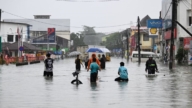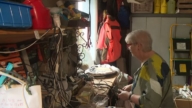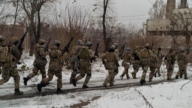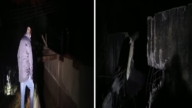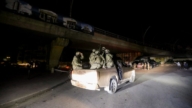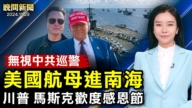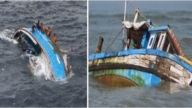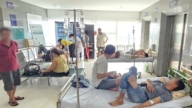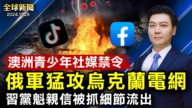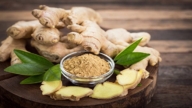【新唐人2012年2月11日讯】缅甸政府军跟克钦族武装组织冲突升级,紧邻中缅边界的中国云南省盈江县城和瑞丽市,有大量难民通过各种民间途径,进入云南境内躲避和寻求庇护,中共当局声称:缅甸内部事情不予插手,不给予援助,目前当地教会正在全力援助难民。
自去年6月9号缅甸政府军与克钦独立军发生军事冲突以来,到目前为止,仍然没有停火的迹象。中缅边境瑞丽、陇川、盈江一线地区陆续涌入大量难民。
云南省盈江基督教会牧师密秉兴透露,目前聚集在边境线上的缅甸难民有6,7万人﹔进入盈江的就有1万多。
牧师密秉兴:“现在难民还是逐步的在增加,很多人在缅甸边境线上,大概有7万左右,在缅甸和中国边境线上的还有6万,1万左右在国内,都涌入我们这边的。”
密秉兴牧师说,难民们处境非常困难,他们缺衣少食又无家可归,都是教会在帮,当局没有提供帮助。
牧师密秉兴:“他们说是他们(缅甸)内部的事情嘛,他们内部的事情…他们说不好插手。难民的情况还需要很多的帮助,主要是吃的这些,那些人多的,我们教会帮助了一些,其他教会的也帮助一些。”
密秉兴还表示,目前一部分难民染上了痢疾和肺结核等传染病,急需治疗。
英国《金融时报》报导,跟以往不同,中共当局这次似乎在限制难民涌入,还封锁了相关消息。报导引用当地援助人员的话说,当局2月几次试图封锁边境。
“中国民主党”全委会泰国负责人程维民认为,当局不让缅甸难民进来是可以预料的。
程维民:“他(中共)近期以来,发现缅甸的政治方面已经有了转变,比如说,在美国和欧盟的长期作用下,缅甸军政府和反对派的势力,尤其是翁山苏姬,他们已经逐步的向着一个,所谓的民主和平过度的这么一个道路上走。”
程维民指出,中缅合营的油管,在克钦族的根据地上,缅甸克钦族就是中国的景颇族人,现在缅甸难民进入中国境内,中共却因为政治利益怕得罪缅甸当局,而不顾人道救援。
程维民:“这一次缅甸政府采取的这个攻打少数民族地区这个武装势力的行动,中共是看到这个趋势已定,所以它就不敢去公开的跟缅甸政府挑战,它就是给予为了它们的既得利益,它们的某些政治上的利益,所以它不顾民族感情,不顾血肉同胞的生死安危,它们只是顾及到它们的政治命运政治上的一些方面。”
前“山东大学”教授孙文广指出,从人道主义和国际义务方面来说,中共当局对待缅甸难民这件事,让人看清了中共宣传一套,做起来又是另外一套的欺世作风。
孙文广:“中国(共)说的和做的是不一样的,按照它们一贯宣传的就是对国外,要实行国际主义的这个义务,要尽到它的义务,按照它宣传的这个观点的话,它应该是欢迎这些人到中国来,给他们一些帮助,使他们生活上有些着落,在这个情况下它就暴露出,它对真正的人道它是不关心的,而是宣传上是一套,做起来又是另外一套。”
缅甸5700万人口却高达135个民族,1948年独立后,政府和各族对当初独立时达成的“协议”解读分歧,多个民族就自治权等问题与政府爆发数十年的武装冲突。
“中国基督徒记者协会”呼吁:缅甸政府军及克钦邦民族武装组织尽早达成和解条约,早日实现停火。
美国和欧盟都曾主张,解除对缅甸制裁的关键条件之一是,缅甸政府应解决与独立武装组织间的冲突。
新唐人记者朱智善、李韵、李若琳采访报导。
CCP Refuses the Burmese Refugees
The conflict between Burma’s army
and the Kachin Independence Army escalated.
Using covert ways, Burmese refugees swarmed to Yunnan
province along the China-Burma border to seek asylum.
Yet the Chinese Communist Party’ (CCP) regime
claimed not to offer aid.
The regime explicitly stated not to intervene in the issue,
for it is Burma’s internal affairs.
So far, these refugees’ living in Yunnan are all relying
on local churches’ assistance.
The armed conflict between Burma’s military and the Kachin
Independence Army still keeps going since June 2011.
Huge fluxes of Burmese refugees entered China’s Ruili city,
Longchuan, Yingjiang, areas along China–Burma border.
Mi Bingxing, Christian priest in Yunnan province, reveals that
about 70,000 Burmese refugees are gathering at the border.
Yingjiang County has experienced influxes
of 10,000 refugees, said Mi.
Mi Bingxing: “So far, the number of refugees keeps growing.
Lots of people are staying at Burma’s border, around 70,000.
About 60,000 of them are flocking at China–Burma border,
another 10,000 have flowed into our region."
These Burmese refugees are in a really difficult situation,
homeless, without food and clothing, said Mi Bingxing.
Yet CCP’s regime did not offer any help to them, all aids
they have gotten so far came from local churches.
Mi Bingxing: “They (the regime) said that’s Burma’s
internal affairs….saying they cannot intervene with it.
The refugees still need a lot of help, mainly food.
The Christian church I stay with helped a lot,
other churches also offered much to some of them."
Mi reflects that some of the refugees have contracted
infectious diseases, like dysentery and tuberculosis, etc..
They are in urgent need of medical treatment.
UK’s Financial Times reported that the CCP’ regime seems
to restrict the refugees’ influx this time.
The regime even blocked related news reports.
UK’s reports quoted local aid workers that the CCP’ regime
attempted to seal off the border in February several times.
Cheng Weimin, Thailand branch director of Democracy Party
of China, says it is expected that CCP will keep refugees out.
Cheng Weimin: “It (the CCP) found that Burma’s
government is making a political shift recently.
For example, under the long-term impact of US and EU,
the Burmese military government and the opposition forces, especially Aung San Suu Kyi, are gradually joining paths.
Step by step, they have headed for the path
of transition to democracy and peace."
Cheng Weimin mentions about the oil and gas pipelines,
a joined venture by CCP’ regime and Burma’s government.
The joint project is located in Kachin’s base area.
In Burma’s Kachin region lives China’s Jingpo ethic group.
Yet the CCP’ regime did not provide
any humanitarian relief to Burma’s refugees.
Cheng reviews the reason behind it – CCP fears offending
Burma’s authorities politically.
Cheng Weimin: “This time, Burmese army initiated attack
in the area of ethnic minority.
The CCP’ regime realized the trend is unlikely to turn back,
so it dared not openly challenge Burma’s government.
For its vested interests and political reasons, it naturally
ignores ethnic sentiments and the ethic group’s safety.
CCP’ regime only concern is its own political interests."
Professor Sun Wenguang from Shandong University,
uncovers the CCP regime’s deceiving mask on the issue.
CCP’s handling of Burmese refugees is in reality different
from its propaganda, Prof. Sun said.
Prof. Sun: “The CCP regime’s acts belied its words.
It always touts to implement international obligations.
In this case, it should’ve welcomed these refugees to China.
It should’ve offered aids to these people for settlement here.
But now the regime is exposed that doesn’t care about them.
All its claims are just propaganda, nothing is put in practice.”
Burma, a population of 57 million,
consists of 135 ethic groups.
The “agreement” about independence reached in 1948,
diverged thereafter among the different parties.
The concerned parties include Burma’s government
and the ethic groups.
Some issues like autonomy triggered decades of armed
conflicts between ethic groups and Burma’s government.
The Association of Chinese Christian Journalists called for
immediate agreement for ceasefire between both parties.
The US and EU stated one of the key conditions
to lift sanctions against Burma.
That is, Burma’s government should resolve the conflict
with independent armed organizations.
NTD reporters Zhu Zhishan, Li Yun and Li Ruolin


